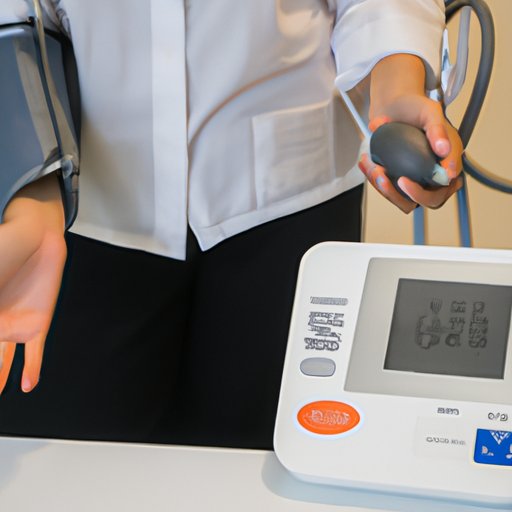Introduction
Blood pressure is the force of your blood pushing against the walls of your arteries as it moves through your body. High blood pressure, also known as hypertension, is a common medical condition that can increase the risk of serious health problems such as stroke, heart attack, and kidney disease. It is important to take measures to lower your blood pressure in order to reduce these risks and maintain your overall health.
This article will provide an overview of the steps you can take to bring your blood pressure down, from exercising regularly and eating a healthy diet to monitoring your blood pressure and consulting with your doctor. By following the advice given in this article, you can make positive changes that will help you to keep your blood pressure in a healthy range.
Exercise Regularly
Regular physical activity is one of the best ways to lower your blood pressure. Exercise strengthens your heart and improves its ability to pump blood, which helps to reduce your blood pressure. According to the American Heart Association, adults should aim for at least 150 minutes of moderate-intensity aerobic activity or 75 minutes of vigorous-intensity aerobic activity each week. Examples of moderate-intensity activities include brisk walking, jogging, swimming, and cycling. Examples of vigorous-intensity activities include running, jumping rope, and playing sports such as basketball and soccer.
It is also important to incorporate strength training into your routine. Strength training exercises such as lifting weights or doing push-ups can help to strengthen your muscles and improve your overall fitness. Aim for two or more days of strength training each week.
Eat Healthy Foods
Eating a healthy diet is another important step in lowering your blood pressure. Eating a diet that is rich in fruits, vegetables, whole grains, and low-fat dairy products can help to reduce your blood pressure. Be sure to limit your intake of saturated fats, trans fats, and sodium. Eating foods that are high in fiber, such as beans, legumes, whole grains, and nuts, can also help to reduce your blood pressure.
In addition, it is important to watch your portion sizes. Eating smaller portions can help to control your weight and reduce your blood pressure. It is also a good idea to avoid processed and fast foods, as these are often high in unhealthy fats and sodium.
Reduce Stress
Stress can lead to an increase in blood pressure, so it is important to find ways to manage stress in your life. Deep breathing, yoga, and meditation can all help to reduce stress and improve your overall wellbeing. Taking time to relax and do activities that you enjoy, such as reading a book or listening to music, can also help to reduce stress levels.
If you find yourself feeling overwhelmed by stress, it is important to reach out to family and friends for support. Talking to someone about your feelings can help to reduce your stress levels and improve your mental health.
Monitor Blood Pressure
Monitoring your blood pressure is an important part of managing your overall health. Keeping track of your blood pressure on a regular basis can help you to identify any patterns or changes that may indicate a problem. It is a good idea to keep a record of your readings and share this information with your doctor.
You can purchase a digital blood pressure monitor to use at home. These devices are easy to use and can provide accurate readings in just a few minutes. You can also have your blood pressure checked at a pharmacy or at your doctor’s office.
Consult Your Doctor
If you are having difficulty bringing your blood pressure down, it is important to consult with your doctor. Your doctor can provide personalized advice and treatment options that are tailored to your specific needs. Your doctor may recommend lifestyle changes, medications, or other treatments to help you manage your blood pressure.
Your doctor can also help to identify any underlying medical conditions that may be contributing to your high blood pressure. It is important to be honest and open with your doctor about your symptoms and any medications you are taking.
Conclusion
Lowering your blood pressure is essential for good health. This article provided an overview of the steps you can take to bring your blood pressure down, from exercising regularly and eating a healthy diet to monitoring your blood pressure and consulting with your doctor. By following these steps, you can make positive changes that will help you to keep your blood pressure in a healthy range.
Take action today to lower your blood pressure and protect your health. With the right lifestyle changes and the support of your doctor, you can successfully manage your blood pressure and reduce your risk of serious health complications.
(Note: Is this article not meeting your expectations? Do you have knowledge or insights to share? Unlock new opportunities and expand your reach by joining our authors team. Click Registration to join us and share your expertise with our readers.)
